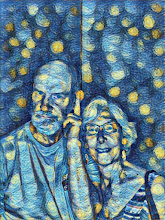One of the things I love about my job is that I get to hang out with really cool people. This past Wednesday night (January 13) Marian University hosted Juan Melendez in a talk on the death penalty. Mr. Melendez was sentenced to death in Florida for a murder he did not commit and served time on death row for 17 years, 8 months, and 1 day. He was released when evidence emerged (16 years after he enter death row) exonerating him for the murder that was pinned on him. Mr. Melendez's impassioned talk caught the immediate attention of the students attending the event.
The death penalty is truly an ethical issue for our times. The recent revelations that innocent people are serving time on death row have caused many government officials to pause and rethink the justice of the death penalty. Former Illinois Governor George Ryan imposed a moratorium on the death penalty in Illinois in 200; it remains in place to this day. The Catholic Church has come out against the death penalty because it violates the ethic of life that the church embraces. There are still many people who struggle to give up their support of the death penalty. As more and more data reveal the inefficacy of this practice as a deterrent to murder, the cost of implementing this policy, and the inequity in its application, we can hope that more people will begin to change their minds on this issue. In a question and answer session, Mr. Melendez and his lawyer, Judi Caruso, noted that the death penalty does not secure our safety because murder rates are higher in states with the death penealty that those without it. Furthermore, the death penalty is disproportionately given to the poor and minorities.
What I found most remarkable in Mr. Melendez's presentation was the humanity he brought to his fellow inmates - the guilty as well as the innocent. He clearly felt affection for many of those who were in prison with him - after all, some of them took him under their wings and taught him to read, write, and speak English, as well as to let go of his anger and resentment at the injustice done to him. I suppose it is difficult for us to think of death row inmates as human - society portrays them as "monsters." But it is imperative that we understand that people on death row - even those who are guilty - are human beings and must be accorded basic human rights. We do an injustice by demonizing even those who have committed heinous crimes.
I had the privilege to host Mr. Melendez and Ms. Caruso in my home after the event. We were able to continue the conversation, but even more importantly, we had the opportunity to get to know one another. They are doing good work in traveling the country to educate young people (and us older folk) about the injustice of the death penalty. Furthermore, they are doing this out of their passion for the cause, not to get rich. Best of luck, Juan and Judi, on the good work you are doing. Thanks for visiting us at Marian University.

No comments:
Post a Comment